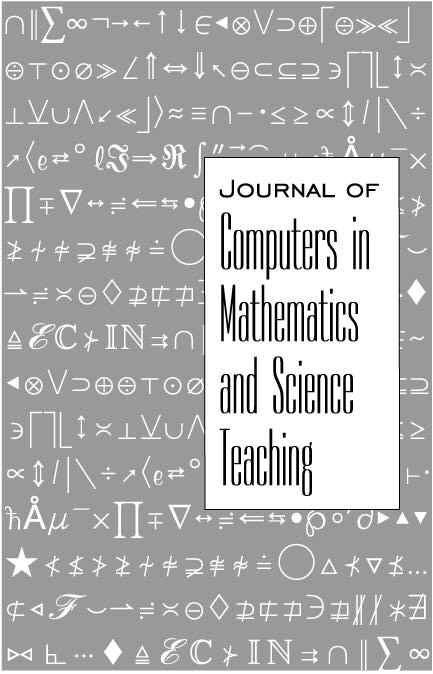
Designing Technology-based Mathematics Lessons: A Pedagogical Framework
Article
Boon Liang Chua, Yingkang Wu, National Institute of Education, Singapore
JCMST Volume 24, Number 4, ISSN 0731-9258 Publisher: Association for the Advancement of Computing in Education (AACE), Waynesville, NC USA
Abstract
In order to effectively integrate technology into mathematics teaching and learning, teachers could create a technology-based learning environment which provides students with opportunities to experience the process of mathematical investigation from exploring with mathematical ideas to making and testing conjectures, as well as extending their conjectures to a general form if possible. Additionally, the learning environment should support students in ways that encourage them to articulate not only what they know about the mathematical ideas in their exploration, but also how they arrive at their conjectures and how they generalise the ideas. This article offers a framework that encompasses the processes of exploring, conjecturing, verifying and generalising to help mathematics teachers plan and design effective technology-based lessons to create an environment which engages students in meaningful learning in the mathematics classroom. An interactive spreadsheet template based on a popular mathematics problem commonly found under the topic of Calculus involving finding the maximum area of a rectangular enclosure given a fixed perimeter was designed to illustrate the framework.
Citation
Chua, B.L. & Wu, Y. (2005). Designing Technology-based Mathematics Lessons: A Pedagogical Framework. Journal of Computers in Mathematics and Science Teaching, 24(4), 387-402. Norfolk, VA: Association for the Advancement of Computing in Education (AACE). Retrieved August 15, 2024 from https://www.learntechlib.org/primary/p/5982/.
© 2005 Association for the Advancement of Computing in Education (AACE)
Keywords
References
View References & Citations Map- Carpenter, T. P., & Lehrer, R. (1999). Teaching and learning mathematics with understanding. In E. Fennema & T. A. Romberg (Eds.), Mathematics classrooms that promote understanding (pp. 19–32). London: Lawrence Erlbaum Associates.
- Cobb, P., Wood, T., & Yackel, E. (1990). Classrooms as learning environments for teachers and researchers. In R. B. Davis, C. A. Maher, & N. Noddings (Eds.), Constructivist views on the teaching and learning of mathematics (pp. 125–146). Reston, VA: NTCM.
- Cobb, P. (1994). Where is the mind? Constructivist and sociocultural perspectives on mathematical development. Educational Researcher, 23(7), 13–20. Davis, R. B., Maher, C. A., & Noddings, N. (1990). Introduction: Constructivist views on the teaching and learning of mathematics. In R. B. Davis, C. A. Maher, & N. Noddings (Eds.), Constructivist views on the teaching and learning of mathematics (pp. 1–3). Reston, VA: National Council of Teachers of Mathematics.
- Fleener, M. J., Westbrook, S. L., & Rogers, L. N. (1995). Learning cycles for mathematics: An investigative approach to middle-school mathematics. Journal of Mathematical Behaviour, 14(4), 437–442.
- Frid, S. (2000). Using learning cycles in mathematics: More than the sum of the parts. Australian Mathematics Teacher, 56(4), 32–37.
- Heid, K. M. (1997). The technological revolution and the reform of school mathematics. American Journal of Education, 106, 5–61.
- Jaworski, B. (1994). Investigating mathematics teaching: A constructivist enquiry. London: The Falmer Press.
- Kaur, B., & Yap, S. F. (1998). KASSEL project report – third phase, National Institute of Education, Singapore.
- Leong, Y. H., & Lim-Teo, S. K. (2002). Guided-inquiry with the use of the Geometer’s Sketchpad. In D. Edge & B. H. Yeap (Eds.), Proceedings of the
- Manoucherhri, A. (1999). Computers and school mathematics reform: Implications for mathematics teacher education. Journal of Computers in Mathematics and Science Teaching, 18(1), 31–48.
- Mestre, J. (1989). Hispanic and Anglo students’ misconceptions in mathematics. Scientifi c Reasoning Research Institute, University of Massachusetts. (ERIC Document Reproduction Service No. ED313192)
- Olive, J. (1998). Opportunities to explore and integrate mathematics with Geometers’ Sketchpad. In R. Lehrer & D. Chazan (Eds.), Designing learning environments for developing understanding of geometry and space (pp. 395–417). London: Lawrence Erlbaum Associates.
- Olivier, A. (1989). Handling pupils’ misconceptions. Paper presented at the Thirteenth National Convention on Mathematics, Physical Science and Biology Education, Pretoria. Retrieved August 19, 2003, from http://academic.sun .
- Oppenheimer, T. (1997). The computer delusion. The Atlantic Monthly, 280(1), 45–62.
- Schoaff, E. K. (1993). How to develop a mathematics lesson using technology. Journal of Computers in Mathematics and Science Teaching, 12(1), 19–27. Sutherland, R., & Rojano, T. (1993). A spreadsheet approach to solving algebra problems. Journal of Mathematical Behaviour, 12, 353–383.
- Vygotsky, L. S. (1978). Mind in society: The development of higher psychological processes. Cambridge, MA: Harvard University Press.
These references have been extracted automatically and may have some errors. Signed in users can suggest corrections to these mistakes.
Suggest Corrections to ReferencesCited By
View References & Citations Map-
Pen Casting in a Teacher Education Program
Nancy Sardone & Barbara Cordasco, Georgian Court University, United States
Society for Information Technology & Teacher Education International Conference 2013 (Mar 25, 2013) pp. 4044–4051
These links are based on references which have been extracted automatically and may have some errors. If you see a mistake, please contact info@learntechlib.org.
